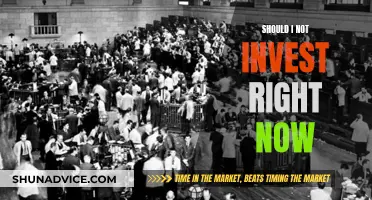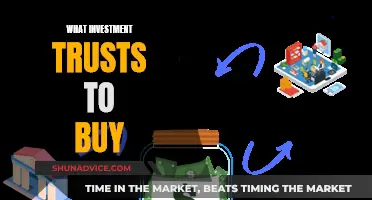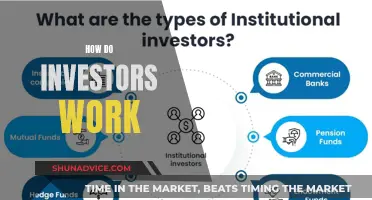
Wholesaling is a short-term investment strategy that can be highly beneficial to your investment portfolio. Unlike traditional investing, wholesaling does not require ownership of the property, making it a low-risk strategy with minimal upfront capital. This strategy is ideal for investors seeking quick profits, as the wholesaler earns a return by contracting a property with a seller and then transferring the rights to an interested buyer.
Wholesaling also offers the advantage of swift financial returns, lower entry investment, and reduced risk from market fluctuations. Additionally, it provides an opportunity to diversify your portfolio and accumulate earnings through rental income. With its short-term nature, wholesaling can be an excellent way to enter the world of real estate investing without the need for large sums of money.
| Characteristics | Values |
|---|---|
| Entry costs | Low |
| Risk | Low |
| Returns | Quick |
| Effort | High |
| Profit margin | Low |
| Credit score | Not required |
| Renovation work | Not required |
| Real estate license | Not required |
| Steady cash flow | Possible |
| Portfolio diversification | Possible |
What You'll Learn

Low-cost entry point
Real estate wholesaling is an attractive option for those looking to enter the property market with a low-cost entry point. It is a legal strategy that allows investors to make a profit without ever purchasing a property themselves or making a down payment.
Wholesaling is a short-term strategy where wholesalers act as middlemen, finding discounted properties, getting them under contract, and then selling that contract to an investor for a profit. The wholesaler never has to own the property, and so there is very little capital required to begin. The main upfront costs are marketing to find deals and buyers, and there is no need for external funding or a good credit score.
The process is relatively simple: wholesalers find a distressed property, get it under contract, and then find a buyer. The buyer purchases the contract from the wholesaler, who makes a profit from the difference in price. For example, a wholesaler might get a property under contract for $90,000 and sell the contract to a buyer for $100,000, making a $10,000 profit without ever owning the property.
Wholesaling is a good option for those looking to enter the real estate market without the financial burden of buying a home outright. It is a low-risk strategy as there is little money upfront, and it is a good way to gain invaluable knowledge about the property market.
Savings Indirectly Matched with Investors
You may want to see also

Quick profits
Real estate wholesaling is a short-term investment strategy that can offer quick profits. Here's how it works:
A wholesaler identifies a distressed property that is priced below market value, often because the property needs work and the owner is motivated to sell quickly. The wholesaler then enters into a contract with the seller to purchase the property at a discounted price.
Next, the wholesaler finds an interested cash buyer, often a real estate investor, who is willing to fix up the property. The wholesaler reassigns the contract to the buyer at a higher price, usually 5-10% more than the original contract price. This price difference is known as the wholesale fee and serves as the wholesaler's profit.
For example, a wholesaler identifies a distressed property and contracts with the seller to purchase it for $100,000. The wholesaler then finds an investor who is willing to buy the property for $120,000. The wholesaler earns a profit of $20,000 without ever taking possession of the property or investing their own money.
The key advantage of wholesaling is the potential for quick profits with minimal upfront investment. Wholesalers do not need to purchase or renovate the property, and they can earn their fee by simply facilitating the deal between the seller and the buyer.
However, it is important to note that wholesaling requires a strong network of investors and a good understanding of the real estate market to identify undervalued properties. It can also be unpredictable, as profits depend on the availability of suitable properties and investors.
Smart Places to Invest $3K Today
You may want to see also

No property ownership
Wholesaling is a great way to get into the real estate business without ever having to own or buy property. This makes it ideal for those who want to enter the real estate market but are short on cash.
Wholesaling involves acting as a middleman between the seller and the buyer. The wholesaler identifies a property that is usually distressed and priced below market value, and the owner is often motivated to sell. The wholesaler then enters into a contract with the seller and finds a buyer, usually an investor, to purchase the property at a higher price. The wholesaler pockets the difference as a profit without having to buy the property or spend money on renovations.
Wholesaling requires very little upfront capital and can be a low-risk way to enter the real estate market. It is a good strategy for those who want to build a network of investors and gain knowledge about the real estate market without the financial burden of property ownership.
Wholesaling also offers the freedom to work on your own schedule and be your own boss. It can be a lucrative business with quick profits, and you can wholesale any type of real estate, from land to apartments.
However, it is important to note that wholesaling requires a strong understanding of the market and the ability to identify motivated sellers and undervalued properties. It can also be unpredictable, as profits depend on the availability of suitable properties. Additionally, there is a risk of losing money on earnest deposits if wholesalers fail to find buyers.
Overall, wholesaling is a great option for those who want to enter the real estate market without owning property, providing an opportunity to learn, grow, and make profits with minimal financial risk.
Japanese Retirement Strategies: Navigating Stagflation
You may want to see also

Low risk
Real estate wholesaling is a low-risk investment strategy. Unlike investing in stocks and bonds, it requires little money upfront. You don't need to purchase the property, make a down payment, or take out a mortgage. Instead, you enter into a contract with the seller and then find an investor to buy it. The wholesaler assigns their rights in the contract to the buyer at a higher price than the original contract price and keeps the difference. This difference is known as the wholesale fee and is usually 5% to 10% of the total property price.
Wholesaling is a short-term business strategy that can generate quick and steady income in the real estate market. It is a good entry point for those who want to become real estate investors but don't have the necessary capital. It also doesn't require a real estate license in most states.
However, it's important to note that wholesaling does come with some risks. For example, you may need to put down a small earnest money deposit, and there is a chance of losing this deposit if you can't find an investor. Additionally, property owners may not understand or be comfortable with the wholesale strategy, and it can take time to find the right properties and build a network of investors.
Investing Strategies for Volatile Times
You may want to see also

No experience/license needed
One of the biggest benefits of wholesaling is that it doesn't require a real estate license or any prior experience to get started. This makes it an attractive option for newcomers to real estate investing. However, while it's not necessary, it may be beneficial to connect with a mentor who has already succeeded in the field.
In most states, a license is not required because wholesalers are not selling properties; they're marketing the contractual rights to buy them. Wholesalers are essentially acting as middlemen, bringing together investors and undervalued properties. Their involvement is limited to a contractual interest, so they don't need a license.
However, it's important to note that some states, like Illinois, do require a real estate license for wholesaling. Additionally, in certain states, licensing can be a grey area. For example, in California, the definition of a real estate broker includes someone who "negotiates" for another party, which could be interpreted as applying to wholesalers. Therefore, it's crucial to consult an attorney and check the specific laws and regulations in your state before engaging in wholesaling.
ELSS: Right Time to Invest?
You may want to see also







